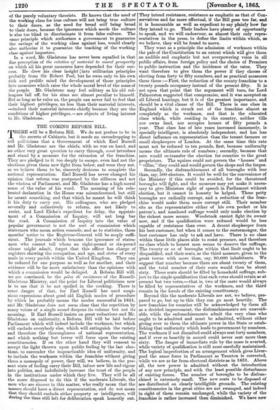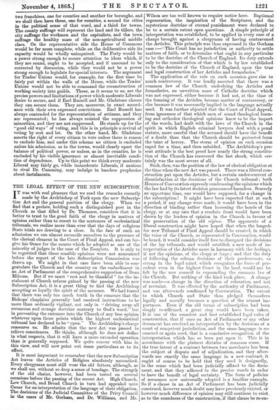THE COMING REFORM BILL.
THERE will be a Reform Bill. We do not profess to be in
the secrets of Cabinets, but it needs no eavesdropping to tell politicians that a Government of which Earl Russell and Mr. Gladstone are the chiefs, with no war on hand, and no other very great question to carry through, must introduce and stand by a measure for the extension of the franchise. They are pledged to it too deeply to escape, even had not the elections given them new light from below, and were they not, as we believe them to be, sincerely desirous to complete the national representation. Earl Russell has never changed his opinion that reform was postponed by the silliness and not the wisdom of Parliament, and Mr. Gladstone has a high moral sense of the value of his word. The meaning of his cele- brated declaration in the House was misunderstood, but still he meant something, and that which he meant he will think it his duty to carry out. His colleagues, who are pledged severally and collectively to reform, are not likely to resist, and Lord Elcho's expedient for delay, the appoint- ment of a Commission of Inquiry, will not long bar the road. A Commission of Inquiry into the value of popular government is not the sort of commission which statesmen who mean action concede, and as to statistics, three months' notice to the Registrar-General will be amply suffi- cient. The journals which bemoan the ignorance of states- men who cannot tell whom an eight-pound or six-pound clause might admit, forget that this officer has charge of registers showing the occupation, and age, and status of every male in every parish within the United Kingdom. They can be reduced for one purpose as well as for another, and their evidence will be far more satisfactory than the opinions with which a commission would be deluged. A Reform Bill will, we are convinced, be the pice de resistance of the Russell- Gladstone Ministry, and the point for Liberal politicians now is to see that it be not spoiled in the cooking. There is some danger of that, for Earl Russell has used suspi- cious expressions about good old English modes of procedure by which he probably means the modes successful in 1831, and Mr. Gladstone does not seem clear that the repetition by many voices of a single sound deepens its volume but not its meaning. If Earl Russell insists on great reductions and Mr. Gladstone on uniformity, a Reform Bill will be laid before Parliament which will indeed include the workmen, but which will exclude everybody else, which will extinguish the variety and therefore the thoroughness of national representation, and which nothing but terror will force upon the existing constituencies. If on the other hand they will consent to accept the light thrown upon public feeling by the last elec- tions, to surrender the impracticable idea of uniformity, and to include the workmen within the franchise without giving them a monopoly of power, they will, we believe, in the pre- sent state of feeling carry their Bill, infuse new life and vigour into politics, and indefinitely increase the trust of the people in the institutions under which they live. They will be all the more disposed to do this if the moderate Liberals, the men who are sincere in this matter, who really mean that the masses should have a direct representation, and do not mean that they should exclude either property or intelligence, will during the time still left for deliberation speak honestly out. They intend resistance, resistance as emphatic as that of Con- servatives and far more effectual, if the Bill goes too far, and it is honourable as well as expedient to say plainly how far they intend to go. Their leaders have plenty of opportunity to speak, and we will endeavour, as almost their only repre- sentatives in the press, to define the limits within which, as we believe, they will be found to move.
They want as a principle the admission of workmen within the pale of the Constitution to an extent which will give them an audible and emphatic but not overpowering voice in all public affairs, from foreign policy and the choice of Premiers to public instruction and the incidence of the rates. They want therefore to give them the power if they choose of electing from forty to fifty members, and as practical measures these three :—First, the reduction of the county franchise to a twenty pounds occupancy instead of the present fifty. It is not upon that point that the argument will turn, for Lord Palmerston suggested that compromise, and it was accepted on all Liberal hustings, but it is of the greatest importance, and should be a vital clause of the Bill. There is one class in England which is struck out of the franchise almost as completely as the workmen, and that is the educated class which, while residing in the country, neither tills nor owns land, nor occupies houses of fifty pounds a. year. That class has of late years increased immensely, is specially intelligent, is absolutely independent, and has less- direct influence on representation than the tenant farmers or small shopkeepers of London. At the same time this rate must not be reduced to ten pounds, first, because uniformity means the ultimate rule of numbers ; secondly, because that rate would re-transfer the election for counties to the great proprietors. The squires could not govern the "houses" and " villas," they could and would govern the shops and the forges.
Secondly, the disfranchisement of all boroughs with less- than, say, NO electors. It would be well for the convenience of the Ministry if this could be avoided, for the threatened boroughs will fight, and the measure may yet make it neces- sary to give Ministers right of speech in Parliament without election, but it cannot in honesty be helped. These petty boroughs are radically corrupt, and a reduction of the fran- chise would make them more corrupt still. Their member sits as the representative either of his own pocket or his patron's, and manhood suffrage would only make election by the richest more secure. Woodstock cannot fight its owner now, and if the qualification were reduced would be less- capable of resistance than ever. A decent shopkeeper fears his best customer, but when it comes to the oostermonger, the best customer has only to ask and have. There is no class within these little places able to resist pressure, and therefore no class which to honest men seems to deserve the suffrage. The twenty or so of boroughs within that limit ought to be disqualified, and their seats, as the third measure, given to the great towns with more than, say, 90,000 inhabitants. We suggest that number because there are about twenty of them, and the total number of their seats would then be about sixty. These seats should be filled by household suffrage, sub- ject to the single qualification that each voter should retain as at present but two votes,—that is, two of the seats would always be filled by representatives of the workmen, and the third remain in the hands of the existing constituency.
Beyond this the moderate Liberals are not, we believe, pre- pared to go, but up to this they can go most heartily. The new franchise for counties will be acknowledged by them ali- as a decided improvement, the disfranchisements are unavoid- able, while the enfranchisements admit the very class who- ought to be admitted and must be admitted, without either giving over to them the ultimate power in the State or estab- lishing that uniformity which leads to government by numbers. The workmen if not disunited could always seat forty members, and if ever so heartily in accord could never seat more than sixty. The danger of immediate rule by the mass is averted, while variety of qualification is still most carefully maintained. The logical imperfection of an arrangement which gives Liver- pool the same force in Parliament as Taunton is corrected, while we are as far from electoral districts as in 1831. Above all, the new power is admitted without the introduction of any new principle, and with the least possible disturbance of existing forces. The number of boroughs to be disfran- chised is extremely small. The new seats to be disposed of are distributed on clearly intelligible grounds. The existing constituencies in the great cities are not swamped, and indeed in eight of them remain unchanged, while the variety of the franchise is rather increased than diminished. We have now two franchises, one for counties and another for boroughs, and we shall then have three, one for counties, a second for cities in the political sense of that word, and a third for towns. The county suffrage will represent the land and its tillers, the city suffrage the workmen and the capitalists, and the town suffrage the healthy mass of the non-agricultural middle class. On the representative side the House of Commons would be far more complete, while on the deliberative side its capacity would be wholly unimpaired. The Forty would be a power strong enough to secure attention to ideas which, if they are sound, ought to be accepted, and if unsound to be corrected by discussion, while they would not be a power strong enough to legislate for special interests. The argument for Trades' Unions would, for example, for the first time be fairly put within the walls of the House, while the Trades' Unions would not be able to command the reconstruction of working society into guilds. These, as it seems to us, are the precise powers and limitations of power which moderate Liberals desire to secure, and if Earl Russell and Mr. Gladstone choose they can secure them. They are, moreover, in exact accord- ance with their own expressed convictions. Earl Russell has always contended for the representation of artizans, and they are represented; he has always resisted the suppression of minorities, and they are not suppressed. He stands up for the "good old ways" of voting, and this is in principle a revival of voting by scot and lot. On the other hand, Mr. Gladstone asserts the right of every citizen to vote unless there is reason to exclude him, and under this scheme no citizen is excluded unless his admission, as in the towns, would clearly upset the balance of political power, or unless, as in the counties, he is excluded by his visible ignorance or almost inevitable condi- tion of dependence. Up to this point we think every moderate Liberal may fairly go, while immoderate Liberals, if anxious to rival Dr. Cumming, may indulge in baseless prophecies about instalments.































 Previous page
Previous page